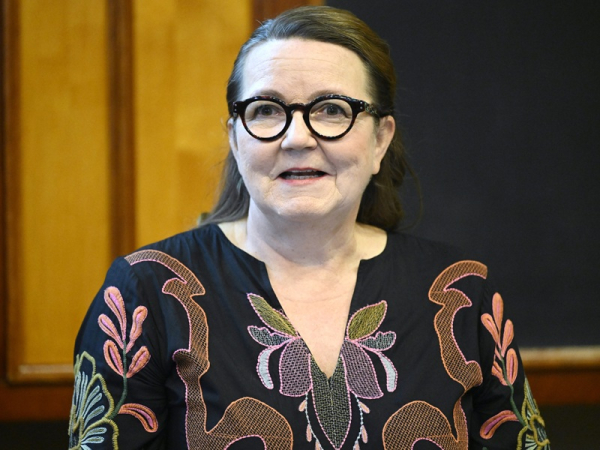
Maijaliisa Erkkola, a professor of nutrition at the University of Helsinki, was photographed at the unveiling of the new national nutritional guidelines in Helsinki on 27 November 2024. Erkkola has since expressed her disappointment at the remarks of some lawmakers that question the scientific basis of the guidelines. Minister of Agriculture and Forestry Sari Essayah (CD), for example, has claimed that the guidelines are not founded on clinical nutritional science. (Heikki Saukkomaa – Lehtikuva)
- Next Article HS: Finnish home builders negotiate prices to spur sales
MAIJALIISA ERKKOLA, a professor of nutrition at the University of Helsinki, has expressed her disappointment with the statements made by some lawmakers about the national nutritional guidelines published in late November, reports YLE.
Minister of Agriculture and Forestry Sari Essayah (CD), for example, has alleged that the guidelines are not founded on nutritional science.
Essayah argued at a press briefing last month that environmental considerations have taken precedence over clinical nutritional recommendations, blurring the goal of promoting public health, according to Suomenmaa. She has pointed to a paragraph in the guidelines that, in her view, indicates that environmental considerations are the reason for a higher level of ambition than in other parts of the Nordics.
“It means clinical nutritional science wasn’t the foundation,” she stated according to YLE.
The paragraph states that the more ambitious recommendations “to reduce harmful environmental effects are in line with international goals, as well as the goals of the Nordic Council of Ministers”.
“It’s insulting that a government that has sought to use scientific evidence to support decision making questions the work done over several years by hundreds of scientists when it’s presented to it. The hostility to science is sad in my view,” Erkkola lamented in an interview with the public broadcaster on Wednesday, 4 December.
Erkkola served as the chairperson of the task force that updated the national nutritional guidelines, based on the Nordic Nutrition Recommendations. The previous national guidelines dated back to 2014.
She reminded that the guidelines are founded on the work of roughly 300 experts across the Nordics. They studies the links between various food groups and health responses for 10 years based on scientific data.
The national guidelines adopted by the countries all ultimately have the same core message: people should eat less meat, more vegetables. Denmark, for example, is already recommending that total meat consumption, including red meat and poultry, be limited to 350 grams a week – the long-term recommendation in Finland.
The Finnish guidelines recommend that people limit the consumption of red meat to 350 grams a week.
Erkkola underscored that all the recommendations are based on high-quality health science. The 350-gram limit on weekly meat consumption, for example, is based on data collected by the World Cancer Research Fund.
It was not until the next phase of the project, she added, that the experts began examining the environmental effects of various food groups.
The conclusion was that the nutritional and environmental goals are congruous. A Finnish modelling study, for example, found not that the lower the consumption of red meat, the greater the benefit for the climate. It also found that both adults and children receive all the nutrients they need even if they consumed no red meat as long as their diet aligns otherwise with the guidelines.
Such findings convince the task force appointed to recommend that total meat consumption, including red meat and poultry, be limited to 350 grams a week in order to minimise the burden on the environment.
“This was calculated purely based on health effects,” Erkkola stated on YLE A-studio on 27 November, defending the guidelines in the face of questions from Peter Östman (CD). “We drew up the recommendations based on science, not politics.”
Östman had argued on the topical affairs show that the guidelines place more emphasis on climate and the environment than public health. “The world has all sorts of studies and different professors,” he stated in response to a question about his unwillingness to trust the assurances of Erkkola.
Erkkola told YLE yesterday that she has also received messages from enraged members of the public – particularly from middle-aged men, who consume about twice the recommended amount of meat. Such messages, she said, are admittedly unpleasant but more understandable than the remarks lawmakers have made about a possible ideological or political bias in the guidelines.
“We all choose what we eat using our own information, finance and time-related re
Source: www.helsinkitimes.fi
